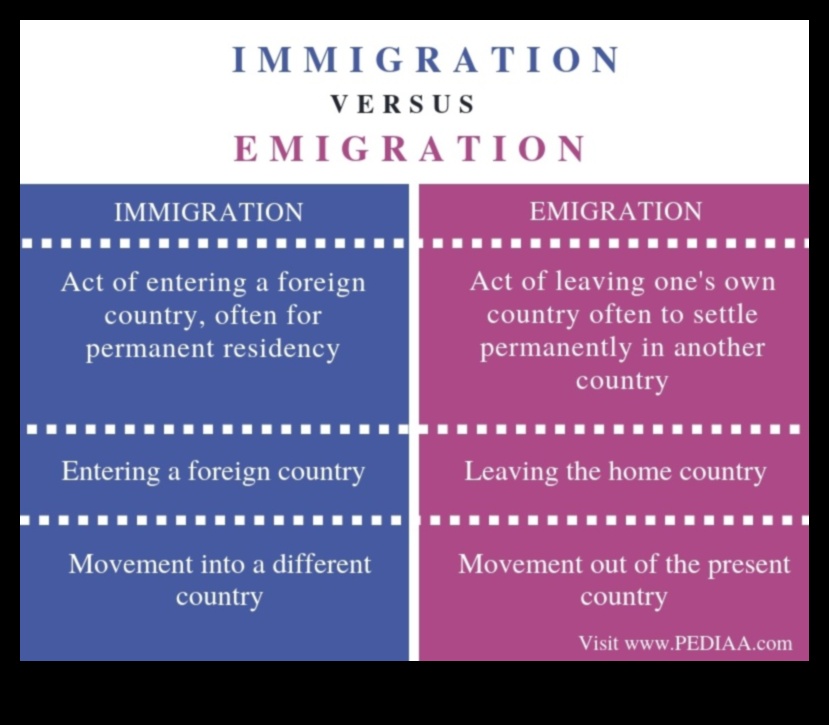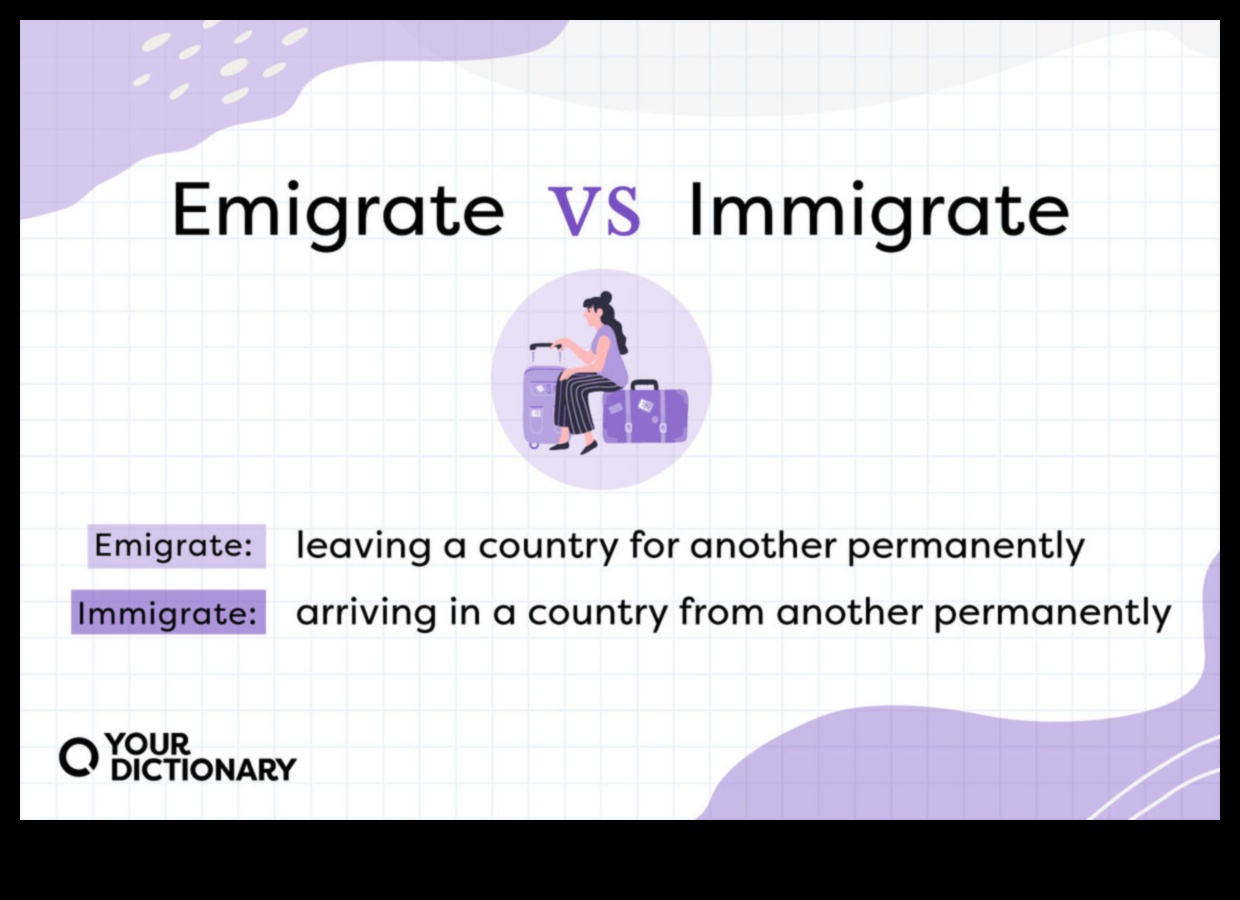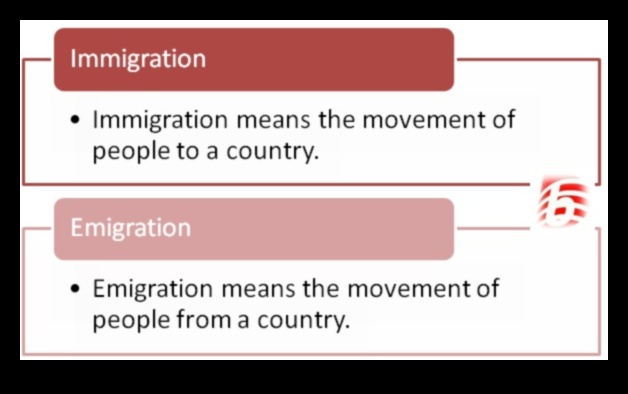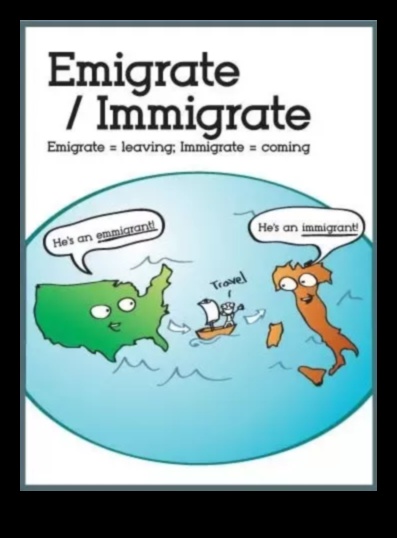
What is the difference between immigration and emigration?
Immigration and emigration are two terms that are often used interchangeably, but there is actually a distinct difference between the two. Immigration is the process of moving to a new country to live permanently, while emigration is the process of moving away from your home country to live in another country.
There are many reasons why people immigrate or emigrate, including economic opportunity, political instability, or natural disasters. Immigrants and emigrants often bring with them new skills, talents, and perspectives that can benefit their new countries.
In this article, we will explore the difference between immigration and emigration in more detail. We will also discuss the causes and consequences of both immigration and emigration, as well as the policies that governments have in place to manage these flows of people.
| Feature | Immigration | Emigration |
|---|---|---|
| Definition | The movement of people into a country to take up permanent residence | The movement of people out of a country to take up permanent residence |
| Causes | Economic opportunity, political stability, family reunification | Economic hardship, political instability, family separation |
| Consequences | Increased economic growth, cultural diversity, social challenges | Decreased economic growth, cultural loss, social challenges |
| Policies | Immigration laws, integration policies, border controls | Emigration laws, diaspora policies, consular services |

II. Difference between immigration and emigration
Immigration and emigration are two terms that are often used interchangeably, but there is actually a significant difference between them. Immigration refers to the movement of people into a country, while emigration refers to the movement of people out of a country.
There are a number of factors that can drive immigration, including economic opportunities, political instability, and environmental factors. Some of the most common reasons for people to immigrate include seeking a better job, reuniting with family, or escaping persecution.
Emigration can also be driven by a number of factors, such as economic hardship, political oppression, or environmental disasters. Some of the most common reasons for people to emigrate include seeking a better job, escaping persecution, or retiring to a more desirable climate.
The distinction between immigration and emigration is important because it can have a significant impact on the lives of the people involved. Immigrants and emigrants may face different challenges and opportunities depending on their status. It is also important to note that the terms “immigration” and “emigration” are not always used in a strictly legal sense. For example, a person who moves to a new country for a temporary job may be considered an immigrant, even if they do not intend to stay in the country permanently.
III. Causes of immigration
There are many different factors that can lead to immigration, including:
- Economic opportunity
- Political instability
- Environmental factors
- Social factors
- Family reunification
Economic opportunity is one of the most common reasons for people to immigrate. When people are looking for better economic opportunities, they may move to countries with higher wages, more job opportunities, or better economic conditions.
Political instability is another common cause of immigration. When people are living in countries with political instability, they may feel threatened or unsafe and decide to move to countries where they feel more secure.
Environmental factors can also lead to immigration. When people are living in countries with environmental problems, such as droughts, floods, or earthquakes, they may be forced to move to other countries in search of a better quality of life.
Social factors can also play a role in immigration. When people are looking for a better quality of life, they may move to countries where they have more opportunities to learn, work, and raise their families.
Finally, family reunification is often a major factor in immigration. When people are separated from their families due to war, political instability, or other reasons, they may move to other countries in order to be reunited with their loved ones.

II. Difference between immigration and emigration
Immigration and emigration are two terms that are often used interchangeably, but there is actually a significant difference between the two. Immigration refers to the movement of people into a country, while emigration refers to the movement of people out of a country.
There are a number of factors that can motivate people to immigrate or emigrate, including economic opportunities, political instability, and environmental conditions. In some cases, people may immigrate or emigrate for a combination of reasons.
Immigration can have a number of positive effects on a country, including increasing the workforce, boosting the economy, and promoting cultural diversity. However, immigration can also have some negative consequences, such as increasing competition for jobs and housing, and straining social services.
Emigration can also have a number of positive and negative effects on a country. On the positive side, emigration can help to reduce population growth, relieve pressure on natural resources, and promote economic development. On the negative side, emigration can lead to a brain drain, as many of the most educated and skilled people leave the country.
Ultimately, the decision of whether to immigrate or emigrate is a personal one that depends on a number of factors. There is no right or wrong answer, and the best decision for one person may not be the best decision for another.

V. Consequences of immigration
Immigration can have a number of consequences for both the country of origin and the country of destination.
Consequences for the country of origin
- Loss of skilled workers and professionals
- Brain drain
- Decreased economic growth
- Increased poverty
- Social unrest
Consequences for the country of destination
- Increased economic growth
- Increased diversity
- Lower wages
- Increased competition for jobs
- Social tension
Ultimately, the consequences of immigration are complex and depend on a number of factors, including the size and scale of immigration, the economic conditions of the country of origin and destination, and the policies that are in place.
II. Difference between immigration and emigration
Immigration and emigration are two terms that are often used interchangeably, but there is actually a significant difference between the two. Immigration refers to the movement of people into a country, while emigration refers to the movement of people out of a country.
There are a number of factors that can motivate people to immigrate or emigrate, including economic opportunities, political instability, and environmental conditions. In some cases, people may immigrate or emigrate for personal reasons, such as to be closer to family or to pursue a new opportunity.
The process of immigration and emigration can be complex and challenging, and it can have a significant impact on the lives of the people involved. However, it can also be a positive experience, and it can lead to new opportunities and a better quality of life.
VII. Policies on immigration
Governments have a variety of policies on immigration, which can include:
- Immigration quotas: These set limits on the number of immigrants who can enter a country each year.
- Visa requirements: These specify the documents that immigrants must have in order to enter a country.
- Naturalization requirements: These set the criteria that immigrants must meet in order to become citizens of a country.
- Remittance policies: These regulate how much money immigrants can send back to their home countries.
- Integration policies: These help immigrants to learn the language and customs of their new country.
The specific policies that a country has on immigration can vary depending on a number of factors, such as its economic situation, its population size, and its history of immigration.
Policies on emigration
Policies on emigration vary from country to country. Some countries have very relaxed policies, while others have very strict policies. The following are some of the factors that may affect a country’s emigration policies:
- The country’s economic situation
- The country’s political situation
- The country’s social and cultural values
- The country’s relationship with other countries
Countries with strong economies and stable political systems tend to have more relaxed emigration policies. This is because they are less likely to be concerned about losing their citizens to other countries. Countries with weak economies and unstable political systems tend to have stricter emigration policies. This is because they are more concerned about losing their citizens to other countries, and they may fear that emigration will lead to a brain drain.
Countries with strong social and cultural values may also have stricter emigration policies. This is because they may be concerned about losing their citizens to other countries, and they may believe that it is important for people to stay in their home country and contribute to society. Countries with more relaxed social and cultural values may have more lenient emigration policies.
Finally, countries with close relationships with other countries may have more relaxed emigration policies. This is because they may be more willing to allow their citizens to move to other countries, and they may believe that it is beneficial for both countries to have a free flow of people. Countries with more distant relationships with other countries may have stricter emigration policies.
IX. Conclusion
In this article, we have discussed the difference between immigration and emigration. We have also explored the causes and consequences of both phenomena. Finally, we have looked at the policies that different countries have in place to regulate immigration and emigration.
It is important to remember that immigration and emigration are complex issues that have both positive and negative consequences. There is no one-size-fits-all solution to these issues, and the best policies will vary depending on the specific context.
However, by understanding the difference between immigration and emigration, we can better appreciate the challenges and opportunities that these phenomena present. We can also make more informed decisions about how to address these issues in a way that benefits all involved.
FAQ
Q: What is the difference between immigration and emigration?
A: Immigration is the movement of people into a country to live there permanently. Emigration is the movement of people out of a country to live in another country.
Q: What are the causes of immigration?
A: There are many reasons why people immigrate, including economic opportunity, political instability, and natural disasters.
Q: What are the consequences of immigration?
A: Immigration can have both positive and negative consequences for a country. Positive consequences include increased economic growth, cultural diversity, and innovation. Negative consequences can include increased competition for jobs, housing, and resources.